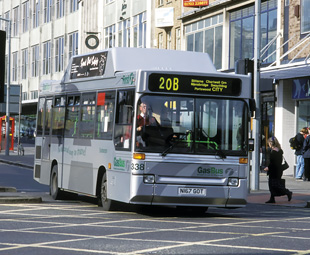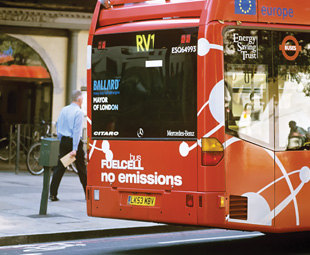Gas-powered buses are we ready?

The Industrial Development Corporation used the annual convention of the South African Bus Operators Association (Saboa) to launch an ambitious project to create jobs and promote exports via the public transport and gas production industry sectors, writes UDO RYPSTRA.
Is South Africa ready for gas-powered buses? This is what delegates at the national conference of the South African Bus Operators Association (Saboa) asked themselves after an announcement by the Industrial Development Corporation (IDC). The IDC said it would fund innovative ideas to promote bus exports from South Africa and bus operators seeking to enter the public transport industry, and that would include vehicles powered by biogas and compressed natural gases (CNG).
The news was one of the highlights of the convention, held at the CSIR conference and exhibition centre. It drew well over 400 delegates and showcased the latest range of buses and coaches, including a gas-powered bus.
A few days earlier IDC CEO Geoffrey Qhena announced that it had launched a R10 billion scheme to run over five years, aimed at facilitating job creation and growing the economy. The IDC’s bus project was revealed by Hannes Malan, project manager of the IDC’s Local Bus and Green Transport Programme, who said more jobs could be created from public transport by localising local bus production and content and by using locally produced fuel.
Malan said IDC hoped to achieve these objectives by encouraging operators to buy locally produced buses by making “favourable” funding available to end-users and manufacturers for “qualifying” buses. Financing would be made in 50/50 joint ventures between the IDC and commercial banks, the latter having the necessary systems, industrial relationships and knowledge to do so.
“So you never queue at the IDC for funding, you still approach the banks,” said Malan, amidst some sceptical laughter. Malan said interested parties would be advised which banks and OEMs had signed up to offer the IDC benefit, and which buses would qualify. “We are already in discussions with the four large banks in this regard.”
Malan said various government departments were also involved. It was recognised that the funding package would need to have a “sweetener to be attractive”. Operators outside South Africa would also be considered provided the IDC had a banking partner with a local presence and provided political risks were manageable in that country.
Various green fuel rules were also being investigated. Proposed qualifying criteria for funding would be for buses of which the OEM had entered into a strategic joint development agreement pertaining to local content and in training and job creation with the IDC. It was also subject to a local commercial bank having signed a joint funding agreement with the IDC which covered that particular brand or product.
 In addition, the bus chassis would have to be manufactured from local CKD, as defined by the IDC, and the bus body would have to be manufactured locally with at least 90% local content.
In addition, the bus chassis would have to be manufactured from local CKD, as defined by the IDC, and the bus body would have to be manufactured locally with at least 90% local content.
The fuel used would also have to be Euro 4 refined biogas or CNG, as approved by the IDC, largely to maximise job creation in the gas production industry.
“The IDC has engaged a large number of OEMs and we are keen to explore localisation at an advanced level with any OEM. We also have a similar strategy for truck and minibus/midibuses,” he added. News that the IDC would consider projects involving gas was welcomed by one of the exhibitors at the convention, John Stavers, GM of Novo Energy, which provides CNG and natural gas vehicle (NGV) solutions. He said that with fuel prices rising and the demand for fossil fuel increasing daily, gas was a cheaper alternative, offering a 25 to 30% saving in fuel costs.
For a relatively small investment, truck and bus engines could be easily converted and offer better returns than Euro 5 and Euro 6 engines could do. Natural gas, not only from underground reserves but from renewable biomass from the country’s coal bed deposits and from landfill sites in Gauteng could provide a sustainable alternative. “It is a growing international trend that will see countries becoming increasingly reliant on natural gas for fuel.” He said Novo Energy offered a tried, tested and proven technology that was ecologically sound, safe and simple to use.
FUNDING AVAILABLE
Outlining the IDC’s overall scheme, Qhena said funding will be available at prime less 3%. This will be across all IDC mandated sectors to businesses that demonstrate economic merit and efficiency in new job creation. Applications would be considered from R1 million up to R1 billion.
The IDC has also reviewed its current pricing model. Projects that have high development impact (including a combination of job creation, rural development, BBBEE, SMEs, and others), will benefit from a reduction of up to 1% on the loan facility. The facility excludes those that may qualify under the R10 billion scheme. “It is still important that businesses have prospects of acceptable profitability to service their financial obligations,” said Qhena.
In addition to the project headed by Malan, the IDC has a Transportation Special Business Unit that focuses on proactively identifying and developing market opportunities that result in the promotion of entrepreneurship, facilitation of transport links and access to financial services in a number of areas:
• Transport services (road freight, logistics, maritime, aviation and bus sector)
• Financial services (retail banking acquisitions and commercial micro-finance)
• Other (security services, listed retail acquisitions and catering services).
While each proposal is considered on its particular merit, preference is given to:
• Emerging or established entrepreneurs wishing to raise finance for:
– A minimum loan of R1 million
– A minimum of R500 000 for bridging facilities for specific contracts
– A minimum of R5 million for equity related transactions
• Applicants must be able to demonstrate economic viability of the proposed transaction
• Entrepreneurs wishing to raise asset finance in the road transportation sector for either start-up or expansion of operations, should contact the IDC Call Centre on 086 069 3888 for contact details of the Absa/IDC Transport Alliance branches.
Whilst each business proposal is considered on economic viability and sustainability in these sectors, preference will be given to projects or transactions that comply with:
• Projects and transactions that have a significant developmental impact, for example rural development, empowerment, job creation, value addition and export generation
• Buy-ins or take-overs by historically disadvantaged persons (HDPs)
• Projects and transactions that promote and facilitate intra-African economic trade through the provision of air, road and sea links
• Transactions that address a prevailing market gap or failure in these sectors in an economically viable manner.
As a minimum requirement Transport Applications will have to comply with certain criteria:
• The applicant must have a primary contract
• The contract must be economically viable and the asset finance/and or working capital provided must be repaid over the term of the financing period.
The IDC has entered into an alliance with Absa to lower the barriers to entry for BEE operators and entrepreneurs in the transport sector. Applicants should note that the IDC criteria differ from the alliance criteria.
Published by
Focus on Transport
focusmagsa



